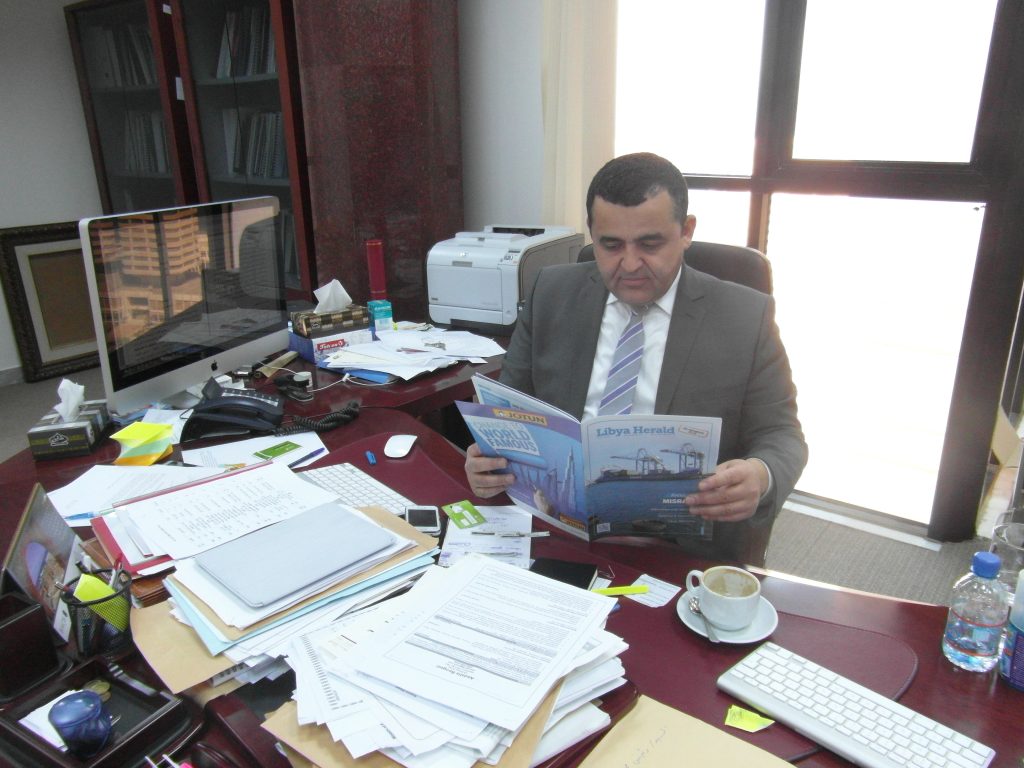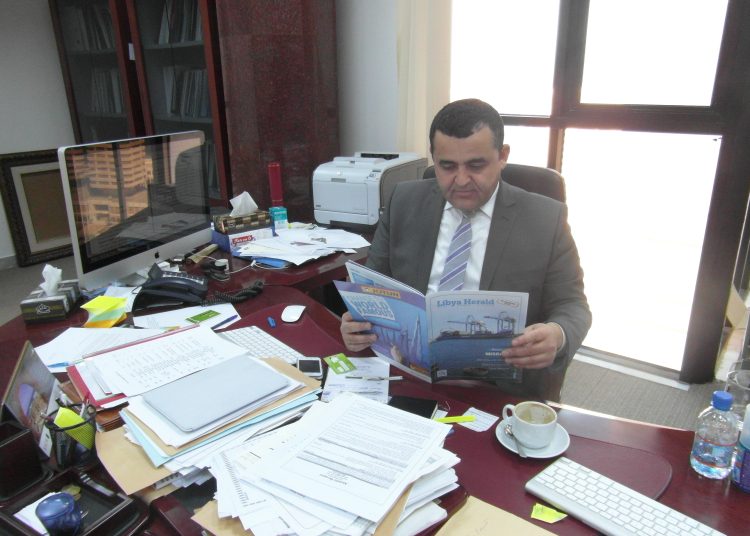By Sami Zaptia.

Tripoli, 5 March 2013:
Libya Herald exclusive!
Since the beginning of February, rumours have been circulating in Libya that the Chairman and CEO of the Libyan Investment Authority (LIA) , the organization that manages Libya’s multi-billion dollar sovereign investment funds, has been removed from his job.
The rumours reached fever pitch when Prime Minister, Ali Zeidan, confirmed openly for the first time in his February 24th press conference that a number of officials had been removed from their posts but that they had refused to leave. But he gave no mention of the organizations he was alluding to. This public revelation led to all sorts of wide speculation on the internet as to who the Prime Minister was referring to.
Meanwhile, Libya Herald had been trying hard to obtain some official documents as proof that an official decision to replace LIA head Dr Derregia was taken. Last week, we had finally obtained copies of this decision, confirmed as genuine by both the LIA and the Prime Minister’s office.
In view of these documents and the decision they hold in them, we interviewed LIA head Dr Mohsen Derregia to hear his side of the story. We also spoke to senior staff at the Prime Minister’s office. And at Thursday’s (28th February) press conference, the Prime Minister finally publicly named the LIA as one of the institutions whose head had been removed from this post.
My first obvious question to LIA Chairman and CEO Derregia was why was he challenging the Prime Minister’s and the LIA’s Board of Trustees’ decision to remove him from his post?
“That decision contravenes the law that governs the LIA. It does not comply with the law or the internal procedures of the LIA”, was his straight forward answer.
Mohsen Derregia explained that the LIA Board of Trustees consisted of seven members:1-The Prime Minister, 2-The Governor of the Central Bank of Libya, 3-The Minister of Economy, 4-The Minister of Finance, 5-The Minister of Planning, plus two independent members appointed by the Cabinet as a whole – and not the Prime Minister personally.
He felt that the process and the internal procedures and steps taken when voting to remove him – were not followed correctly.
The LIA was set up to operate as an independent body, at arm’s length from the day to day ups and downs of politics, he explained. It is supposed to be a body concerned with the long term investments of Libya for future generations. It is supposed to be stable, transparent and worthy of the confidence of its counterparties both inside and outside Libya. It is supposed to be protected from the fickle whims and desires of politicians – Derregia clarified.
The LIA outgoing head also felt that the LIA is not supposed to be a political body, reflecting the political colour of the executive in power. It is also not supposed to be loaded with political appointees which are changed every time Libya gets a new government.
Moreover, with regards to the Board of Trustees of the LIA, Derregia explained that it is supposed to be an oversight body that stands back and allows the managers and directors to operate the LIA while making sure that the overall strategy that has been set is adhered to in the overall long term interest of the ultimate shareholders – ie, the people of Libya. It is not supposed to interfere in the everyday affairs of the LIA as that would simply create confusion and leave counterparties wondering who is really in charge.
Derregia pointed out that if the LIA was meant to be under the direct everyday control of the executive, it would be part of the annual budget. But the funds of the LIA are removed from Libya’s oil money – taken away from the executive – so that they are invested long term. The annual state budget is meant to be under the everyday control of the executive – cabinet and Prime Minister – but the LIA Sovereign fund is designed to be independent.
The LIA head then exploded the myth that most of the LIA’s assets have been unfrozen “Not even 5% of the LIA’s funds have been unfrozen. This is costing us hundreds of millions per year. The LIA has requested on numerous occasions since July 2012 that its funds be unfrozen. But we have not received a single reply. The last letter was sent on 4th December”.
Finally and most importantly, the LIA head had an important point of principle to make. Mohsen Derregia felt that Libya and Libyans had suffered much as a result of the 17th February Revolution in order to remove a dictator and a dictatorial regime. Libyans had died and got maimed and injured in their tens of thousands – for what he asked?
In order to remove a lawless regime and install a regime built upon the rule of law – he answered his own rhetorical question. Laws, processes, systems and procedures are what the new Libya was supposed to be about. It is no longer supposed to be a nation built around a person or a personality cult or based upon nepotism, favouritism and cronyism. Political figures should have limited powers – within strict parameters set by democratically determined rules and laws, the LIA head explained.
This principle should above all apply to the Prime Minister. The Prime Minister should not in the new Libya be able to appoint whoever he wants to whatever post he wishes. There should be clear and transparent rules, processes and regulations.
To this end Derregia felt that the Board of Trustees did not follow the applicable rules, regulations and the law in their decision to remove him. Derregia said that the law states that the period for his board tenure is 3 years and ending the membership of any board member has to be justified. This is the legal rule that applies to this situation.
But no substantive objections have ever been raised to his performance – either by the Board of Trustees or by the Government as a whole. Indeed, every three months the LIA produces and delivers a report on its operations to the Board of Trustees but it has not ever even responded to any of them – let alone raise any objections or criticisms about LIA’s performance.
Since Derregia strongly believes that he has committed no transgressions, legally speaking the onus is on the Board of Trustees and the Prime Minister to prove their case and they had not given any reasons for their decision.
However, he stresses that there is no truth to the claim that he refused to leave LIA. He has not been provided with a date for handover, nor did anyone call him about the handover – or anything else for that matter.
Equally, Derregia felt that making a leadership change at the top of the LIA now risks wasting many months of hard work in the effort to recover the LIA’s assets, as numerous high profile actions involving literally billions of dollars are ready to be commenced in just the next few weeks. The turmoil following a leadership change would risk delaying these actions substantially, maybe even leading to their being time barred, he felt.
Further, there is no national audit report relating to the period that Mohsen Derregia managed LIA: indeed, according to Derregia, the report the Prime Minister referred to during his press conference on 28th February was actually sent to the Committee on Investment in the National Congress on 25th February 2013 – after the Board of Trustees made their decision – and it relates to the year ending 31st December 2011, well before Dr Derregia assumed his post at LIA.
Therefore, using the report to justify his dismissal is, in his opinion “disingenuous”. It appears instead that the Prime Minister, according to Derregia, is looking to install a loyal team of people at the LIA, but he very well could not say that in the press conference!
In closing I asked the potentially outgoing LIA head what will be his next steps. He stated that he had already filed a legal challenge in the Libyan courts seeking to overturn the Prime Minister’s decision on the basis that it was legally invalid and has been advised that his case is very strong.
In this regard, Derregia stated that, quite aside from personal considerations (he is under contract for three years and he left a good job with long term tenure in the UK in good faith for the LIA job) and the possible reputational damage caused to him by the amateurish way in which the government has handled this situation, the real issue at stake in this matter is whether Libya will be a nation ruled by laws or by the will of one man.
And he is willing to fight very hard for that principle. [/restrict]










